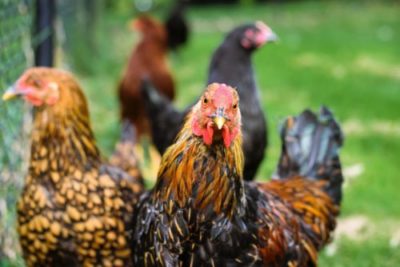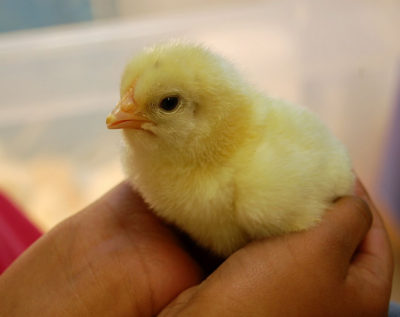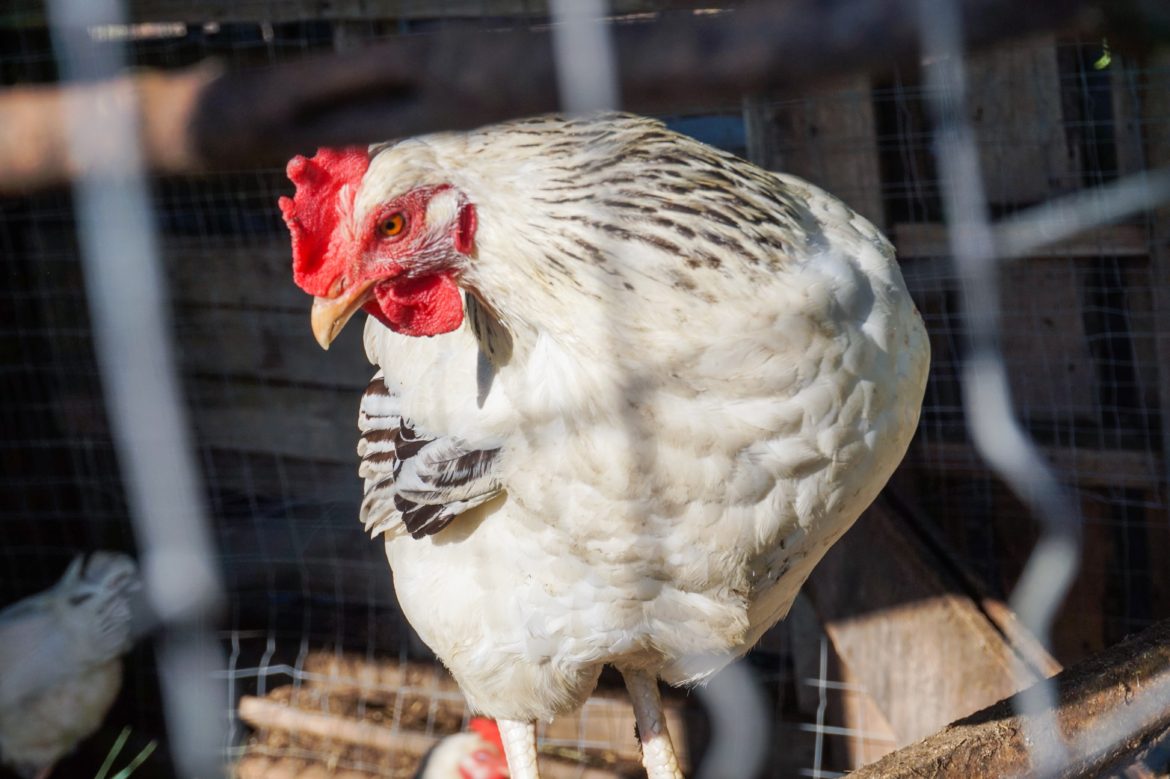Years ago, I was with a group for an early American educational weekend. We were to experience part of life as early settlers did, including the making of meals from start to finish. In preparation for supper, our group was told we had to kill a chicken. We were all expected to be there, whether or not we were directly involved in the killing and prepping of the chicken for the evening meal.

Mary Albert Darling
There were a variety of immediate reactions from the group, ranging from I’ll do it to I can’t watch. I won’t go into the details, except to say that after the chicken had been killed, there was mostly silence, except for two group members who had moved away from the group, and were quietly crying. After a few minutes, some group members expressed how troubling it was to watch the chicken be killed and that they would not be eating any of it at supper. Because of the preparation involved in readying the chicken, it would be several hours before we ate. When supper time came, much later than the group had anticipated, those who were adamantly opposed to eating the chicken, ate it.
Even though this weekend experience was several years ago, I have thought about it several times since. Those who said they would not eat the chicken, made it clear it was because the killing was so hard to watch. What they had previously experienced with eating chicken had not included all that was actually involved in farm to table processes, much less the visual and auditory experiences of slaughterhouse to table processes.
 But, as the afternoon went on, they changed their minds. Why? I propose that it was because they forgot to remember. They forgot to remember what they saw, heard, thought, felt, and decided during a significant learning event. Instead, other competing desires surfaced in the time that elapsed. In this case, it was hunger. The further away the group members got from this possible value-shifting event, the easier it became to downplay the event, and even forget.
But, as the afternoon went on, they changed their minds. Why? I propose that it was because they forgot to remember. They forgot to remember what they saw, heard, thought, felt, and decided during a significant learning event. Instead, other competing desires surfaced in the time that elapsed. In this case, it was hunger. The further away the group members got from this possible value-shifting event, the easier it became to downplay the event, and even forget.
Remembering is crucial for any kind of change and has strong implications for the well-being of God’s creation. It is so important, that is shows up early in Biblical accounts. In Deuteronomy 6:4-9 (NIV) we read:
Hear, O Israel: The Lord our God, the Lord is one. Love the Lord your God with all your heart and with all your soul and with all your strength. These commandments that I give you today are to be on your hearts. Impress them on your children. Talk about them when you sit at home and when you walk along the road, when you lie down and when you get up. Tie them as symbols on your hands and bind them on your foreheads. Write them on the doorframes of your houses and on your gates.”
 These verses tell us that after giving the people of Israel the commandments, God didn’t expect them to remember. There were too many competing values and desires for God’s people to stay focused on what was most important for living out what it means to love God and others. The same is true today. We can strongly desire to love, and therefore care for all of God’s creation, and that desire can manifest itself in a sincere commitment to not eat meat. But then time passes, and we can forget to remember the importance of our commitment and why we made it.
These verses tell us that after giving the people of Israel the commandments, God didn’t expect them to remember. There were too many competing values and desires for God’s people to stay focused on what was most important for living out what it means to love God and others. The same is true today. We can strongly desire to love, and therefore care for all of God’s creation, and that desire can manifest itself in a sincere commitment to not eat meat. But then time passes, and we can forget to remember the importance of our commitment and why we made it.
It is not only making a commitment to remember that is key to how we care for animals: how we remember is crucial to staying committed. In the Deuteronomy verses above, God gave very specific ways to remember: talk about them—all day. Talk about them when we get up, when we go about our day, and when we sit at home, including when we eat together. Because the oral tradition of storytelling was historically how people best remembered, we can assume that telling stories played a crucial role in talking about how to keep God’s commands.
I wonder what would have happened that day if our group had continued to talk about the killing of the chicken, bringing in all of our senses, as any good story does. What would have happened if together we remembered what we saw, and heard, and smelled? I wonder if the retelling of the story as we got closer to the meal would have reminded those who did not want to eat the chicken to keep that commitment.
 We are to tell stories—including, and at times especially, the uncomfortable ones—not only for others, but for ourselves. Our stories help us remember what is important to us and thereby stay with the reality of our choices. Recently I saw a semi-truck with a beautiful, serene landscape painted on the side, a carton of eggs highlighted in the foreground. Viewers were invited to buy those particular eggs through association with the visuals surrounding the carton. Nowhere on the carton did it say the eggs were from free range chickens, which most likely means they were not. As the truck went by, I wondered how many people would buy those eggs if instead, the picture was of an unsanitary piece of land with thousands of chickens so crowded together that they could not move.
We are to tell stories—including, and at times especially, the uncomfortable ones—not only for others, but for ourselves. Our stories help us remember what is important to us and thereby stay with the reality of our choices. Recently I saw a semi-truck with a beautiful, serene landscape painted on the side, a carton of eggs highlighted in the foreground. Viewers were invited to buy those particular eggs through association with the visuals surrounding the carton. Nowhere on the carton did it say the eggs were from free range chickens, which most likely means they were not. As the truck went by, I wondered how many people would buy those eggs if instead, the picture was of an unsanitary piece of land with thousands of chickens so crowded together that they could not move.
We are to remember what is importing by telling the stories that are real, not the stories we want others to believe are real. There is a theory called “persuasion via mere exposure” which states that we can be persuaded simply by continuing to see and hear the same message again and again. Advertisers know this and implement it every day. We can do the same. We must not forget to remember to tell the stories that lead to more loving, ethical treatment of animals. If we tell these stories when we get up, when we go out, and when we prepare to sit at the table together, we will help God’s intended vision for loving, peaceable relationships–among all of God’s creation–to come on earth, as they are in heaven.
Mary Albert Darling is co-author with Tony Campolo of:
- The God of Intimacy and Action: Reconnecting Ancient Spiritual Practices, Evangelism, and Justice and Connecting
- Like Jesus: Practices for Healing, Teaching, and Preaching




